Source: New Zealand Government
The New Zealand Defence Force (NZDF) will deploy three additional personnel to the Republic of Korea, increasing the size of its contribution to the United Nations Command and its Military Armistice Commission from nine to 12 personnel.
“Increasing the size of our deployment to the Republic of Korea reflects the importance that New Zealand places on collective security efforts that support peace and stability and the international rules-based system in the Indo-Pacific region, and on the Korean Peninsula in particular,” said Nanaia Mahuta.
The three additional personnel will take on new roles in the United Nations Command Headquarters. They will work alongside a broad range of contributing nations including the Republic of Korea, the United States, Australia, Canada, Denmark, Thailand and Colombia.
“This decision reflects our strong commitment to the United Nations, the Republic of Korea and supporting peace and stability on the Korean Peninsula – and in the Indo-Pacific more widely,” said Peeni Henare.
Minister Henare also commented on the value of this deployment to the NZDF.
“This deployment is an excellent opportunity for our Defence Force personnel to develop their skills, leadership and experience in a multinational environment, building our future leaders”.
The mandate for New Zealand’s longstanding deployment to the Republic of Korea has been extended to August 2023. The NZDF has contributed the United Nations Command and its Military Armistice Commission since 1998.
Additional Q&A:
Q: Why is New Zealand deploying three more personnel to the Korean Peninsula at this time?
A: New Zealand is a strong supporter of peace and stability on the Korean Peninsula, from our significant contributions during the Korean War, to our long-standing contributions to the UN Command and its Military Armistice Commission since 1998.
The security situation on the Korean Peninsula is of great importance to the stability of the Indo-Pacific region.
The addition of three personnel to our current deployment reflects our commitment to collective security in the Indo-Pacific.
Q: What are the UNC and the UNCMAC?
A: The UN Command and the Military Armistice Commission provide a multinational command tasked with maintaining the armistice agreement and facilitating diplomacy between North and South Korea.
Q: What do New Zealand personnel deployed to the Korean Peninsula do?
A: The NZDF personnel deployed to the Republic of Korea conduct Armistice monitoring, education, inspection and operations functions.
Q: What are the new roles?
A: The NZDF will fill new roles in the UN Command that support the development of plans, orders and concepts of operations for activities on the Korean Peninsula.
Q: What is the current security situation on the Korean Peninsula, are there any risks to NZDF personnel deployed there?
A: The situation on the Korean Peninsula is a key regional and global security concern.
We encourage continued efforts towards diplomatic engagement to advance denuclearisation and reduce tensions.
Our personnel deployed to the Republic of Korea receive appropriate pre-deployment training and mitigations are in place to ensure their security. In the event of hostilities on the on the Korean Peninsula, New Zealand would assess its approach at the time.
Q: What is the legal basis for this deployment?
A: The Meyer Agreement of 1952 provides the legal basis for our personnel deployed to the UN Command and its Military Armistice Commission in the Republic of Korea.
Q: Is this a peacekeeping mission?
A: The UN Command is mandated by the UN Security Council and conducted under the UN flag, however due to the legal status of the United States as executive agent of the UN Command, it is not technically a UN peacekeeping mission.
Q: How is the NZDF mitigating the impacts of COVID-19 on the mission and possible transition between countries?
A: COVID-19 has had an impact on the sustainment of approved NZDF deployments. Officials continue to monitor the effects of COVID-19 on missions in which NZDF personnel are deployed. The three new personnel deploying to the Republic of Korea will undertake COVID-19 quarantine requirements upon arrival.



